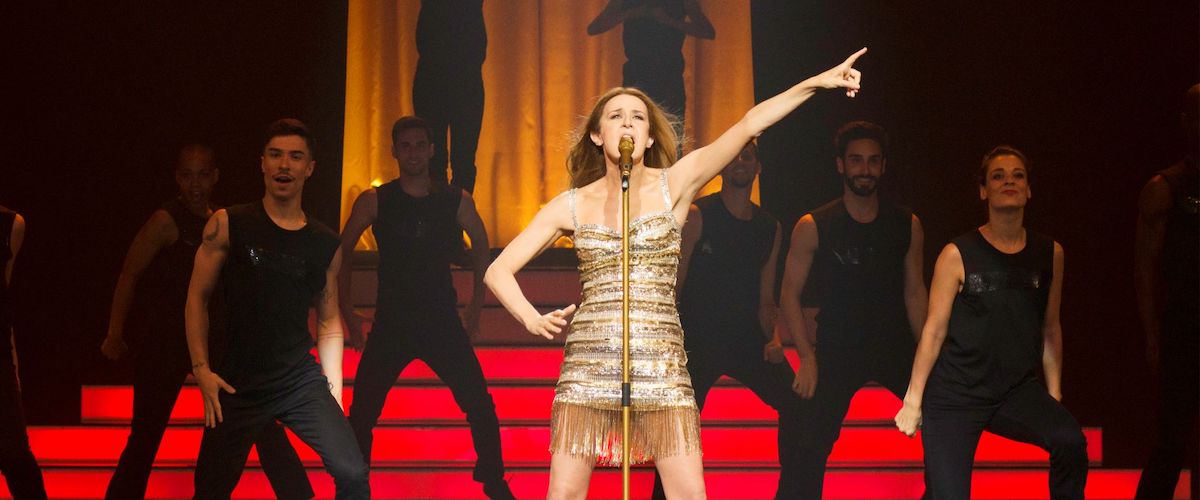About ten minutes into “Aline,” a film “inspired” by the life of Celine Dion, something happens that is so horrifying, so inexplicable, there was no way the film could recover. To be specific (as well as transparent), I, the critic, never recovered. The choice was so baffling that questions about it dogged the rest of my viewing experience. Why was this choice made? Did they have any idea what it actually looked like? Was there not a “cooler head” at any point in the post-production process who could have asked the simple question: “This looks really really weird. Why are we doing this again?”
The moment:
“Aline” stands below the stage where her family sings. She is the 14th child, decades younger than her siblings. They sing, grinning down at her occasionally, and she peeks up beneath the stage, eyes glimmering with what is probably supposed to be happiness and also foreshadowing. This little pipsqueak is going to be bigger than all of her siblings one day, and she already knows it! Okay, fair enough, pretty standard, in terms of biopics. But what makes this moment so jarring and downright weird is that the 56-year-old airbrushed face of Valérie Lemercier, the star (and director) of “Aline,” has been awkwardly superimposed on the child’s body. “Awkwardly” is an understatement. The overall effect is so creepy it breaks the fabric of not just the film, but reality itself. My soul rejected what I was seeing. My response was: What in the Uncanny Valley is going on here?
This “device” continues through “Aline”‘s early sequences showing Aline’s rise as a child singing phenom. Either Lemercier’s face has been digitally superimposed, or she has digitally shrunk her own body so she appears to be a child surrounded by adults. When she’s sitting at the dinner table surrounded by her huge family, the effect is so strange it’s almost distressing. There is an Uncanny Valley sitting at the table and nobody bats an eye.
The film opens with the following statement: “This film is inspired by the life of Celine Dion. It is, however, a work of fiction.” The “however” is pretty shady! One wonders what Dion might think of all of this. Valérie Lemercier has directed vehicles for herself before, and she is obviously an enormous Celine Dion fan. Is she so much of a fan that she couldn’t bear to hire a child actress to play child Celine? She needed to embody six-year-old Celine as well?
Aline is born to elderly working-class parents, and it’s a very close family, held together by the stern and generous mama Sylvette (Danielle Fichaud). One of Aline’s older brothers has connections in the music business, and sends a tape of his 12-year-old sister to a record producer named Guy-Claude Kamar (Sylvain Marcel), obviously a stand-in for René Angélil, who was Dion’s manager and eventual husband. Dion’s marriage to Angélil made headlines at the time. There was the age difference, yes, but the fact that he had managed her since she was a child generated even more gossip. The romantic scenes between Marcel and Lemercier are awkward, to say the very least, but at least by this point in the film Lemercier is actually a normal-sized human with her own head!
As biopics go, setting aside the Uncanny Valley, “Aline” is fairly innocuous, and it makes all the same mistakes most biopics make. The film obediently trudges through all of the events that make up this extraordinary singer’s career, from winning Eurovision in 1988, to recording her mega-hit “My Heart Will Go On” for the “Titanic” soundtrack (Aline hears the opening chords of the demo and says, “I don’t like it”), to the grind of her Las Vegas residencies, the isolation of fame, the struggles of being a working mother, etc. There’s no real conflict, though, since Dion hasn’t had a controversial career dogged by “dramatic” events like addiction or love affairs or public scandal. She did have to go on vocal rest for three months once, to save her vocal cords. So that’s something.
What’s missing is an exploration of Dion’s art as a singer. This is the missing piece of most biopics, which generally find scandal far more fascinating than an exploration of why the person is famous in the first place. Child Aline (with her adult face) is shown pasting pictures of Barbra Streisand over her bed, but other than that, there is no delving into Dion’s influences, her understanding of her instrument, how she decided to make sounds work for her. Dion’s voice is otherworldly as is her sense of the dramatic, her ability to project, to ground herself into the earth so her voice can go as high as it needs to go. According to “Aline,” she emerged fully formed as a brilliant singer and performer (or, as fully formed as a 12-year-old with a digitally-superimposed adult face can be). One cool thing about “Aline” is it focuses more on Dion’s French-language songs than her mega-hits like “All By Myself” and/or “My Heart Will Go On.” Victoria Sio is the singer throughout, and she does an amazing job approximating Dion’s specific phrasings and sounds, all as Lemercier lip-synchs and gestures up a storm.
Dion’s path from sleeping in a dresser drawer as a baby to living in a 40-room mansion has a lot of inherent interest in it. It’s not that the story shouldn’t be told. But no matter what happened in “Aline,” no matter what heights or relative lows she reached, I kept remembering her Uncanny-Valley face peeking up from beneath the stage, gleaming and winking and grinning. Once seen it could not be unseen.
Now playing in theaters.




















